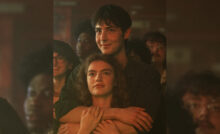Exclusive Interview: Pop Culturalist Chats with Will Brill


Daniel Fish’s Oklahoma! has been one of Broadway’s buzziest openings. After a transfer from Brooklyn’s St. Ann’s Warehouse, this reimagined production features an incredible production crew and a fantastic cast.
Actor Will Brill joined the Oklahoma! family as Ali Hakim when they landed on Broadway. He’s no stranger to the stage; Will Brill began his career in off-Broadway and Broadway shows like Our Town and You Can’t Take It With You. He then went on to act on screen like fan favorite TV shows The OA and The Marvelous Mrs. Maisel.
We chatted with him about Oklahoma!, what it was like joining the production, and other types of roles that he’d like to tackle in the future.
PC: Since you joined this cast in the transfer to Broadway, how did you prepare for your role? Did you see the production at St Ann’s Warehouse?
Will: I did. I saw the production by happenstance. I had never seen Oklahoma! before, and I heard that there was this really wild production of it at St Ann’s. I was lucky enough to score a ticket, and I came away from it thinking, “What a weird night of incredible theater.” I never anticipated that I would be a part of it in the future. I got a call or email while I was in Cambodia on my honeymoon asking for a tape and I said, “I don’t know how I would do that in Cambodia.” Then, they waited for me to come into the room which was amazing. It was just very lucky happenstance.
PC: So after that did you go back and watch movies of the original production?
Will: No. To be perfectly honest, I had pretty complicated feelings about the character as he was on the page. I wanted to figure it out on my own. Ali Hakim seems, to me, to be sort of a vestige from another time and another style of American playwriting. So, if I was going to take a crack at it, I wanted to find an inroad that made sense to me and that I could feel ethically ok with portraying. [That’s] not to say that every character a person plays needs to be ethically ok, but I think a person should understand what they’re in dialogue with when they’re playing a role. So I purposefully steered clear of other portrayals of him to get right with my own mind with what he was going to be.
PC: Did you feel any pressure being the “new guy”? Was it challenging since everyone else had already been a part of the production for so long?
Will: I felt immense pressure because the show was a resounding success, and some of these people have been working on the show for years already. In Patrick’s case [Patrick Vaill plays Jud], he’d been working on it for over a decade–with Daniel, of course. I felt pressure to rise to the occasion. When I came into the space, though, the ease with which I was taken into the company and the kindness and patience I was shown by Daniel and the rest of the creative team made me feel very safe. The pressure was still there to bring life and challenge to the production since everybody in it is so talented, but I was able to play and explore in whatever way and at whatever speed I needed which was real, real cool. It was a really cool and rewarding process.
PC: How did you go about developing Ali Hakim? Do you have a backstory for him in your mind?
Will: I do have a little bit of backstory for him in my mind. Daniel allows his actors whatever process they need to develop their characters, but he doesn’t demand that sort of mining from the actors. So, I got to enter into this character and said to myself, “Why does this guy refer to himself as a foreigner? As a Persian? As a peddler of goods? How does that serve him?” and “What does it mean that I, a white person, am playing that guy?”
The basis I came from is that this is a guy who knows what he wants, who gets what he wants, and cares little about the people he has to step on in order to get those things, which I find to be terribly American in a lot of ways. I think that serves the play and serves this telling of the play in a pretty cool way.
PC: You’ve been on Broadway before, but, obviously, this production is quite different from traditional shows when it comes to the staging. It’s in the round and the lights are on most of the time. Does that change the way you as an actor interact with the audience or how you interact with the other actors in the show?
Will: To perform in the round is by far my favorite way to play in the theater. It allows an actor to interact immediately and honestly with their fellows rather than cheat out to the audience or make sure that the joke is loud enough to land with everybody. [In the round] it’s taken for granted that your back will be facing somebody at all times, and you can’t apologize for that. Let’s all lean forward and hunker down together.
The first couple of plays that I did in New York were at the Barrow Street Theater with David Cromer, and they were incredibly intimate and close productions. In Tribes, we were literally squeezing over people’s legs. During one performance of Our Town I literally fell into the audience because everyone was so close, and I was very tired. That immediacy makes the audience feel like they are inside the world instead of feeling like it is being presented to them in some way. As an actor, it’s really freeing to be incredibly intimate with everything you’re doing.
PC: Have there been audience reactions that, in the moment, made you react in what you were doing or that surprised you?
Will: Yeah, absolutely. At the end of the play, I was sitting at a table next to a woman who kept repeating the words, “Oh my God. Oh, God” under her breath. It was really thrilling to be that close to somebody as they were having that experience.
On the flip side of that, at the very, very end of the show, the cast is certainly going through a lot of emotional turmoil and sometimes you look out at the audience, and they’re having a rip-roaring good time. They seem to be celebrating the murder of a person that they’ve just witnessed on stage. So having them clapping along and stamping their feet is a pretty jarring and horrifying experience for us on stage–which is cool because that is not an experience you get to have very often as an actor in the theater.
PC: Is there a scene that you look forward to performing each day because you know the audience is going to react–particularly since people may be expecting the more traditional version of the show and be surprised with some of the choices in this reimagined version?
Will: There are a few of those that I really look forward to. There’s a very weird scene between Ali Hakim and Jud that’s a really sort of uncomfortable moment between two very questionable characters. They’re two characters that the audience is alternately asked to revile and feel badly for as two outsiders–or feel that they’re getting their comeuppance. It’s very unclear. That scene is so fun because those two characters are so unaware of each other’s emotional states and that makes the scene feel dangerous. You can kind of hear the audience’s discomfort with it which I really enjoy.
PC: On a lighter note, is there another classic musical that you’d like to see get reimagined in this way that feels very fresh and timely, what would you pick?
Will: Oh gosh. That’s a really good question. To tell you the truth, I don’t feel equipped to answer it. Being in a musical at all is a real M. Night Shyamalan twist in my career. I’ve been embedded in a lot of TV lately and Indie films so to be in a musical on Broadway is, like, pretty jarring for me. [It’s] something I thought I had left in my past. Although there are a lot of musicals that I really love and that I would someday love to be a part of…as far as reimagining, I’m not sure. That would be a good question for Daniel Fish.
PC: Beyond Broadway, as you mentioned, you’ve worked on some popular TV series. Those series span genres and time periods. So, looking ahead in your career, is there something that you’d still like to do?
Will: There’s a million tropes or worlds that I would love to find myself in. I would love to play a cowboy, or a superhero, or a super-villain, or an eternal, or an alien. There’s a million of those kinds of worlds.
At the end of the day, what I really love about theater and storytelling and TV and film is being able to explore more about the human condition and unlock my own and other people’s empathy. I think that there is a lot of room for storytelling that does that. Any sort of character that really dives deep into exploring a person with the intention of helping people better see themselves or [others] around them is a dream.
PC: Obviously with TV series, you can develop your character over time whereas in theater you perform the same moment in a character’s story every night. Do you find that more challenging?
Will: I actually find it more rewarding. I think there’s different schools of thought on this, but I personally am more ready to be moved when I am in a room with other people. I find the challenge much more bracing to be performing in a room with other people, encouraging them to see what is happening on stage, and to also really distill a performance so that it can be more easily read. Getting the opportunity to do that 350 times is a really exciting challenge to me.
With TV and film, I find it difficult to find those moments within several takes that will then be preserved forever. The catch of that is that I do think some people feel more open and vulnerable to being changed in the privacy of their own home, or in the darkness of a movie theater where the people that they’re watching can’t turn, look into their eyes, and see what they’re feeling. I see and applaud the transformative power of cinema and television, but I personally feel it more palpably in the theater.
Pop Culturalist Speed Round
Last TV Show You’ve Binge-Watched
[laughs] Season 2 of The OA
Favorite Film
It’s a Wonderful Life
Favorite Play or Musical
Our Town
Musician You Could Listen to on Repeat
Josh Ritter
Hidden Talent
Making up story-songs
If You Weren’t a Performer, You Would Be…
A farmer or laborer
Place You Most Want to Go to
The Maldives
Person You Most Want to Meet
Barack Obama
Recent Posts
Exclusive Interview: How The Parenting’s Dean Norris Took That Scene to the Next Level
Craig Johnson’s The Parenting delivers the perfect blend of horror and hilarity, turning a classic…
Exclusive Interview: Director Craig Johnson and Writer Kent Sublette on Balancing Horror, Comedy, and Heart in ‘The Parenting’
Meeting the in-laws is stressful enough—throw in a 400-year-old poltergeist, and things go completely off…
SXSW 2025: Florence Hunt and Rory Walton-Smith on ‘Mix Tape,’ First Love, and Their Artistic Process
First love is unforgettable. It leaves an imprint, shaping the way we see the world,…
SXSW 2025: Why ‘F*ckUps Anonymous’ Is More Than Just a Show—Joe Tierney, Katrina Whalen, Sarah Jeffery & Andrew Michael Fama on Giving a Voice to the Voiceless and the Power of Storytelling
Television has the power to do more than entertain—it can challenge, heal, and transform. Some…
SXSW 2025: Siobhan McCarthy, Misha Osherovich, and Nico Carney on Reclaiming Comedy Classics with Trans Inclusion in ‘She’s the He’
Comedy classics like Mean Girls, She’s the Man, and Clueless have shaped generations with their…
Daring, Unpredictable, and Unforgettable: Tyler Cornack’s ‘Mermaid’ Dives into SXSW 2025 with Stars Johnny Pemberton and Avery Potemri
To say Tyler Cornack is a visionary would be an understatement. His fearless approach to…



View Comments